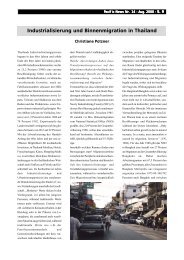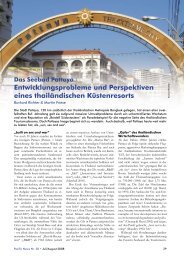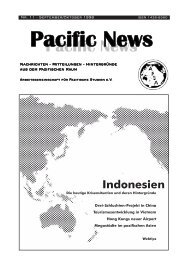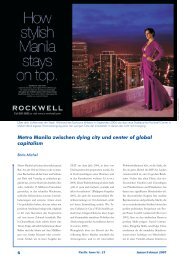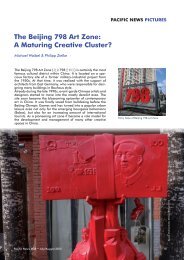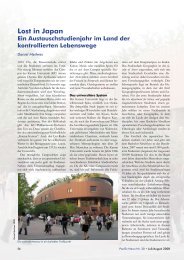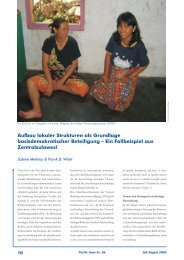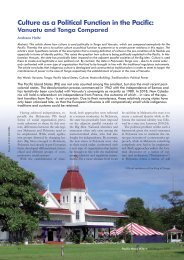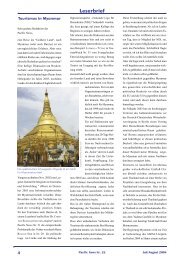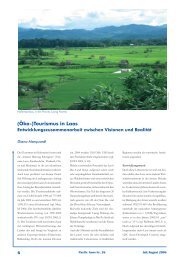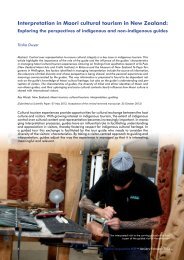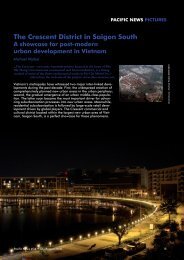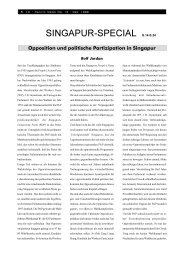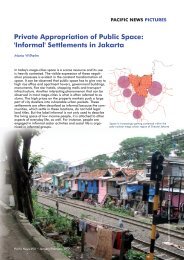Towards a New Pacific Theatre
Towards a New Pacific Theatre
Towards a New Pacific Theatre
You also want an ePaper? Increase the reach of your titles
YUMPU automatically turns print PDFs into web optimized ePapers that Google loves.
The Blue Shawl: From the left: Tia Barrrett, Tema Kwan Fenton-Coyne,<br />
Ngahuia Murphy (Noh Chorus in the background) in THE BLUE SHAWL<br />
(written / directed John G. Davies): Hamilton, 2008<br />
cess of cultural exchange, particularly in<br />
the context of colonialism. Colonialism<br />
does not operate through exchange: rather<br />
it appropriates, decontextualises, and<br />
represent the ‘other’ culture, often with<br />
the complicity of its colonial subjects.<br />
Guiding Principles for<br />
Intercultural Exchange:<br />
It is impossible within the scope of this<br />
article to cover all the issues of intercultural<br />
performance. To conclude I would<br />
like to articulate a number of guiding<br />
principles with regards to intercultural<br />
exchange.<br />
1. Consider and absorb the original cultural<br />
and historical context of the material<br />
or stories that you are using as<br />
you point of departure<br />
2. Ensure that your working relationships<br />
are mutually beneficial, and that<br />
there is equal pay amongst the collaborating<br />
artists<br />
3. When working with an international<br />
or intercultural ensemble of actors<br />
allow the performers to use their first<br />
tongue and their native performance<br />
codes, and cultural expressions<br />
4. Through the use devising and collaborative<br />
strategies allow each artist a<br />
voice in the exploration and generation<br />
of performance material<br />
The Blue Shawl:<br />
The Blue Shawl (2008) is a recent <strong>New</strong><br />
Zealand intercultural performance that<br />
is exemplary in the way it adhered to the<br />
fore-mentioned guidelines. The show is<br />
giving the Mãori perspective on a historical<br />
event - wrapped in a poetic narrative<br />
- and presented within the structure<br />
and staging conventions of a Nõ Play,<br />
incorporating Kapahaka (Mãori performing<br />
arts) expressions, using both Mãori<br />
and English language, with a mixed cast<br />
of Mãori and Pakeha performers, and<br />
accompanied by Taonga Puoro (traditional<br />
Mãori musical instruments), a small<br />
Taiko Drum and Nohkan (a Japanese<br />
flute).<br />
The original historical incidents were<br />
considered and absorbed within their<br />
cultural context by writer / director<br />
John Davies. Permission to tell this story<br />
was obtained beforehand, and the performance<br />
material was developed in ongoing<br />
partnership and consultation with<br />
a close relative of the protagonist of the<br />
initial story. Throughout the writing and<br />
rehearsal process John consulted the appropriate<br />
Kaumatua (Mãori elders) in<br />
matters of Te Reo (Mãori language) and<br />
Tikanga Mãori (Mãori protocol). All the<br />
artists, involved in this project, participated<br />
on a voluntary basis, motivated by a<br />
deep commitment to tell this particular<br />
story, a strong desire to work with the<br />
director, or both. The Mãori performers<br />
were able to use Te Reo as well as English;<br />
they were encouraged to incorporate<br />
Mãori codes and expressions, such<br />
as Mãori footwork, wiriwiri (fluttering<br />
of the hands), pukana (facial animation),<br />
waiata (song), haka (dance), and Mãori<br />
actions.<br />
As the director, John is committed to<br />
creating the right atmosphere and circumstance<br />
that invite the appropriate response<br />
from the performers. He places<br />
huge value on the contribution of each<br />
individual, and allows room for experimentation<br />
and error. As such he employs<br />
devising strategies that allow each<br />
participating artist to have a voice in the<br />
ultimate performance.<br />
Final Quote:<br />
“If inter-culturalism is born through<br />
the meeting of ‘self’ and the ‘other’,<br />
the real challenge is to maintain<br />
the reciprocity of this dynamic“<br />
(Bharucha 1993: 155)<br />
Bibliography<br />
Balme, Christopher B. <strong>Pacific</strong> Performances: Theatricality<br />
and Cross-Cultural Encounter in the South Seas. London:<br />
Palgrave Macmillan, 2007.<br />
Bharucha, Rustom. <strong>Theatre</strong> and the World: Performance<br />
and the politics of Culture. London & <strong>New</strong> York: Routledge,<br />
1993.<br />
Denzin, Norman K. & Yvonna Lincoln. The Sage<br />
Handbook of Qualitative Research. London & <strong>New</strong> Delhi:<br />
Sage Publications, Inc., 2005.<br />
Greenwood, Janinka. History of Bicultural <strong>Theatre</strong><br />
– Mapping the terrain. Research Monograph Series,<br />
Christchurch, 2002.<br />
Haseman, Brad. A Manifesto for Performative Research.<br />
Media International Australia incorporating Culture and<br />
Policy, theme issue "Practice-led Research" (no. 118): pp.<br />
98-106, 2006.<br />
Maufort, Marc & David O’Donnell (eds.). Performing<br />
Aotearoa: <strong>New</strong> Zealand <strong>Theatre</strong> and Drama in an Age<br />
of Transition. Brussels: P.I.E. Peter Lang S.A., 2008.<br />
Royal, Charles. Te Whare Tapere. Wellington: Department<br />
of <strong>Theatre</strong> and Film, VUW, PhD thesis, 1998.<br />
Van Dijk, Bert. Devised <strong>Theatre</strong>: A Devising Model.<br />
eBook: www.theater-tools.com, 2006.<br />
Van Dijk, Bert. Practical Exercises for Devisers. eBook:<br />
www.theater-tools.com, 2007.<br />
Bert van Dijk [bertvd@clear.net.nz] is a Dutch-born theatre pedagogue and director, who directed<br />
numerous productions in a great variety of genres: classics, devised theatre, mime, physical, bi-cultural,<br />
inter-cultural, musical, community and outdoor theatre. He is currently a PhD student at the Victoria<br />
University of Wellington and a lecturer at Whitireia Polytechnic.<br />
He has an own website: www.theater-tools.com<br />
<strong>Pacific</strong> <strong>New</strong>s Nr. 31 • Januar/Februar 2009<br />
31



